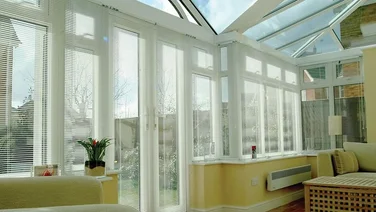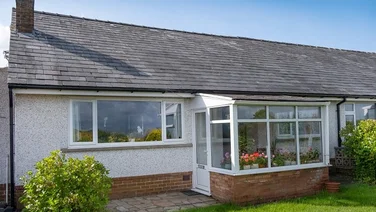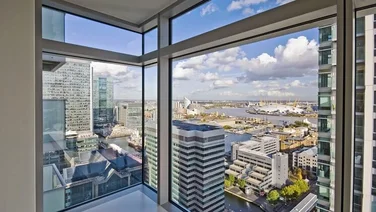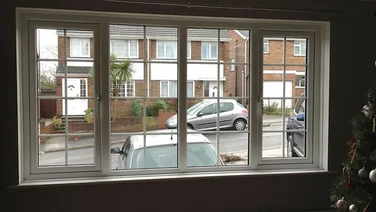- What government grants are available for double glazing?
- Home Upgrade Grant (now closed)
- Home Energy Scotland Grant and Loan
- Affordable Warmth Scheme
- How much can you save with double glazing grants?
- What do I do if I don’t qualify for any double-glazing grants?
- What can I do with old double glazing?
- Summary
- Government grants are intended to help low-income households save energy
- Many households will not be eligible as the criteria are quite strict
- Interest-free loans are available to replace windows in Scotland
- Most big double-glazing installers offer finance options via third parties

One of the most effective ways to reduce your energy bills is to install double-glazed windows and doors.
The core advantages is cutting down on your monthly bills, as well as removing any cold draughts, condensation and mould as you improve your home’s insulation. What’s more, you’ll notice that your home is quieter and feels decidedly more cosy with new windows and doors installed.
The average cost for a double glazing installation in the UK is around £11,000. While there are government grants and funding schemes available to help cover these costs, they are intended to help the lowest-income households and have quite strict eligibility criteria around them.
If you do not quality for a grant to get new windows and doors for your home, you may want to look at finance options that will help you spread the upfront costs into more manageable monthly payments.
Alternatively, you can get free quotes from our trusted suppliers who will be able to help with any available grants. Fill out the form below to receive them now.
What type of double glazing do you need?
Get startedWhat government grants are available for double glazing?
While there are no specific grants for windows and doors, double glazing is covered by various energy-saving home improvement schemes. In this guide we’ll take you through each government grant, loan and funding scheme so you can find out if you might be eligible, and how to apply.
For starters, here’s an overview of what’s available, with further details about each scheme below:
| Grant | Type of installation | Regions covered | Eligibility criteria | Timespan |
|---|---|---|---|---|
| ECO4 and ECO Flex | Double glazed doors and windows | England, Scotland, Wales | Low-income and fuel poor households | 1 April 2022 – 31 March 2026 |
| Home Upgrade Grant (HUG2) – Now closed | New windows and doors, and draught-proofing | UK | Low-income households, off-grid, low energy efficiency rated property | April 2023 – March 2025 |
| Home Energy Scotland Grant and Loan | Upgrading single glazing and draught proofing area available | Scottish homeowners | Scotland | May 2017 – ongoing |
| Affordable Warmth Scheme | Draught-proofing windows and doors, replacing single-glazed windows and doors | Northern Ireland | Residents earning under £23,000 annually | September 2014 – ongoing |
| Welsh Government Warm Homes Nest Scheme | Energy-efficient home improvements (currently excludes double glazing) | Wales | Based on income-related benefits and properties with low energy performance ratings | 2011 – ongoing |
Two double-glazing grants are available to pensioners, depending on their individual circumstances: the ECO4 scheme and the Home Energy Scotland Grant and Loan. More on them later.
If you live in an older property, we’ve answered whether you can install double glazing on a listed building.

Get free double glazing quotes
Answer a few quick questions, and our trusted installers will send you bespoke double glazing quotes – for free.
ECO4
ECO4 is the fourth version of the government’s Energy Company Obligation (ECO) scheme, which ends in March 2026.
The scheme obliges a list of select energy providers to pay for energy-efficient home improvements for low-income and energy-poor households.
Improvements that the Ofgem-administered scheme covers include cavity wall insulation, boiler replacements, heat pump installation, and double glazing (replacing single glazing with double glazing, or replacing old double glazing).
There is no set amount for funding with ECO4 since it depends on what your chosen energy supplier decides your home needs.
ECO4 eligibility requirements for double glazing
You might be eligible to get double glazing with ECO4 if:
- Your home has a low EPC rating (D to G)
- AND someone in your household receives at least one of the following benefits:
- – Child Benefit
– Pension Guarantee Credit - – Income-related Employment and Support Allowance (ESA)
- – Income-based Jobseeker’s Allowance (JSA)
- – Income Support
- – Tax Credits (Child Tax Credits and Working Tax Credits)
- – Universal Credit
- – Housing benefit
- – Pension credit saving credit
You don’t need to own your home to receive funding from ECO4; it’s open to private tenants (with their landlord’s permission) and those in social housing.
See Ofgem for further details.
How to apply for ECO4
To apply for ECO4, contact one of the energy providers participating in the scheme.
This doesn’t need to be your current supplier, and Ofgem actually recommends that you contact multiple suppliers to find the best deal.
Energy suppliers that can carry out improvements under ECO4
Here’s a list of the energy suppliers that are part of ECO4 and how to contact them:
- British Gas: application portal
- E (Gas & Electricity): email James.thornicroft@e.org
- E.ON: application portal
- Ecotricity: email compliance@ecotricity.co.uk or call 07529 902172
- EDF: application portal
- Octopus Energy: application portal
- Outfox the Market: email hello@outfoxthemarket.co.uk or call 0800 103 2702
- OVO Energy: application portal
- Scottish Power: application portal
- Shell Energy: email eco@shellenergy.co.uk
- SO Energy (including ESB Energy): application portal
- The Utility Warehouse: call 0333 777 0777
- Utilita Energy: application portal
Alternatively, you can also apply through the Gov UK website.
Most companies will have an online application to confirm your eligibility.
Once you have done this, you’ll receive an email containing a unique reference number and a document. You will be asked for your permission to contact the Department of Work and Pensions to confirm your benefits.
Within a week, you should be contacted to arrange a free survey. This survey will ask you to carry out a 10-15 minute inspection of your home’s energy efficiency measures and is designed to be minimally intrusive.

Get free double glazing quotes
Answer a few quick questions, and our trusted installers will send you bespoke double glazing quotes – for free.
ECO Flex
ECO Flex is a mechanism in the ECO4 scheme that allows local authorities, the Scottish and Welsh governments, and energy suppliers to refer households for energy improvements funding, even if they don’t meet the benefits criteria of ECO4.
The scheme was designed to open up grants to more low-income households, as many don’t meet the threshold to receive benefits.
Check with your local authorities and/or energy provider to see if you qualify for the window replacement grant.
ECO Flex eligibility requirements for double glazing
To be eligible for ECO Flex through a referral from your local authority or devolved nation, you must live in an energy inefficient home AND:
- Have a household gross annual income of £31,000
- OR a person in your household has a health condition that makes them vulnerable to the cold (a cardiovascular condition, a respiratory disease, limited mobility, or immunosuppression)
To get referred to ECO Flex by your energy supplier, you must:
- Be on a non-Pre-Payment meter and have been in fuel debt for over 13 weeks
- OR be on a Pre-Payment meter and have self-disconnected, OR have received supplier discretionary/friendly credit within the last 13 week, OR be in a debt repayment plan with their energy supplier, OR be repaying your fuel debt through 3rd party deductions
Contact your local authority or devolved nation to find out if you’re eligible for ECO Flex. You can usually find contact details on their website.
Energy suppliers usually refer customers, but you can still contact them if you think you qualify for ECO Flex and they haven’t yet done so.
Home Upgrade Grant (now closed)
The Home Upgrade Grant was designed to give households between £3,000 and £24,000 for home improvements that increase a property’s energy efficiency. Up to 40% of the total amount granted could be spent on double glazing.
The Home Upgrade Grant was only available in 45 local authorities in England, and ran until March 2025.
It’s open to low-income households that are off the gas grid, including homeowners, renters, and those living in social housing.
Home Upgrade Grant eligibility requirements
Prior to being closed, applicants would be deemed eligible for the Home Upgrade Scheme if:
- Their household income was less than £31,000 a year
- AND they were off the gas grid
- AND their home had an EPC rating of D, E, F, or G
- AND they lived in one of the 45 local authorities that applied for the grant
How to apply for the Home Upgrade Grant
New applications for this grant have now closed, but you can consider applying for the Warm Homes Local Grant instead.

Get free double glazing quotes
Answer a few quick questions, and our trusted installers will send you bespoke double glazing quotes – for free.
Home Energy Scotland Grant and Loan
Home Energy Scotland is a scheme funded by the Scottish Government that will help you replace single glazing with double glazing, among other energy saving home improvements.
Grant funding isn’t available for double-glazing, but you can get an interest-free loan to replace single-glazed windows and doors with double-glazed ones.
The loan cannot be used to replace old double glazing.
Home Energy Scotland eligibility requirements
You might be eligible for the Home Energy Scotland loan if you meet one of the following requirements:
- You’re a homeowner living in Scotland
- You’re building your own home
- You’re not a landlord
- You’re not a property developer
How to apply for the Home Energy Scotland
Home Energy Scotland is advising applicants to complete a Home Energy Check before reaching out to them.
Once you’ve done that, you can phone 0808 808 2282 or use Home Energy Scotland’s email contact form. Someone will run through the best options for your home with you.
You can find a full guide of the application process on the Home Energy Scotland website.
Affordable Warmth Scheme
The Affordable Warmth Scheme was launched in 2014 and aims to protect low-income homes in Northern Ireland from fuel poverty by providing £7,500 toward energy efficiency improvements, such as installing new double glazing.
If your home is solid-walled, the grant can be increased to £10,000.
If you are a homeowner or private property tenant in Northern Ireland and your total gross income is less than £23,000 per year, you may be eligible for assistance getting new windows. The amount you qualify for will be determined after an inspection of your home and your specific needs.
This assessment will also determine the extent of work needed to be carried out, but it can quickly provide sufficient funding for a grant for double-glazed windows.
Affordable Warmth Scheme eligibility requirements
You might be eligible for the Affordable Warmth Scheme (NI) if you meet one of the following requirements:
- You are a Northern Irish resident (obviously)
- You own and occupy your property as your main home or you rent from a private landlord (i.e., not social housing)
- You have your day/life interest in the house (i.e. not a holiday home, B&B, or a building used for commercial practices)
- You have a total annual gross income of less than £23,000
How to apply for the Affordable Warmth Scheme
If you meet the criteria above, you make an application to the Affordable Warmth Scheme via the NI Energy Advice Service (NIEAS) by phone at 0800 111 44 55 or via email at NIenergyadvice@nihe.gov.uk.
If you are deemed eligible, a technical officer will visit your home for an inspection. This will assess the energy efficiency measures needed, especially those provided by the scheme.
It is important to note that the scheme offers upgrades in priority order based on a four-tiered hierarchy. These are as follows:
- Priority 1 covers installing or replacing cavity wall insulation and the draught-proofing of windows and doors.
- Priority 2 covers heating improvements such as boiler replacement.
- Priority 3 covers the replacement of single-glazed windows.
- Priority 4 covers solid wall insulation.
If an applicant is successful, improvements will be carried out in the order of priority until the funding is used up.

Get free double glazing quotes
Answer a few quick questions, and our trusted installers will send you bespoke double glazing quotes – for free.
How much can you save with double glazing grants?
The ECO4 grant could save you 100% of the cost of buying and installing double glazing.
The Scottish Home Energy Loan could save you hundreds of pounds since it’s an interest free-loan, making paying in installments much cheaper than if you’d gone with an installer’s financing option.
As a nice bonus, investing in your property with improvements (like double glazing) can also increase the value of your home.
If you want to get started on making your home more efficient, take a look at our seven easy ways to improve your property’s EPC rating, and our guide to government grants for insulation that can help fund your projects.
What do I do if I don’t qualify for any double-glazing grants?
If you don’t qualify for double glazing grants, there are other ways to reduce costs. Here are just a few:
- Some other options exist, like Green Deal Loans and the Barclays Greener Home Rewards (Barclays Mortgage customers only).
- Get at least three quotes from different double-glazing installers and negotiate to find the best deal
- Go for the least expensive materials and designs, such as uPVC casement windows
- Choose fixed panes, which are cheaper than windows you can open, for entrance halls, corridors, and other rooms that don’t need an open window
- Opt for double-glazed windows with a lower energy rating – B or A – as they’re cheaper than A+++ windows and still more insulating than single-glazing
- Have your windows installed in winter, especially right before Christmas when demand is low and prices go down. Some installers also have sales in January. Others may even offer in-house finance options to help spread the cost.
Hopefully, these tips can help you reduce costs. Just remember to be wary of cheap double glazing. Price can reflect quality; as with most things in life, if something is too good to be true, it probably is.
What can I do with old double glazing?
Old or unused double-glazed windows can be recycled. Window installers will typically remove old windows from your property for you, but not all of them recycle – the windows often end up in landfills.
If you want to avoid this, you can recycle certain parts of the windows, such as the glass panes, at a local recycling centre. Or you can contact a window recycling specialist company, such as VEKA Recycling.
Anglian’s scrappage scheme allows you to recycle your old double glazing to help offset the cost of a new installation. To find out more about it, check out our dedicated guide on the subject.
Summary
- There are two government grants that can be used for double glazing: the ECO4 Scheme and the new Warm Homes Local Grant
- Unfortunately, the Home Energy Scotland Grant can’t be used for double glazing, but you can get an interest-free loan through the scheme
- It never hurts to check if you’re unsure whether you meet the criteria for any of these government schemes; they could save you thousands of pounds on your installation
- If you’re not eligible for any grants, it’s still worth investing in double glazing if you can. According to the Energy Saving Trust, replacing single glazing with double glazing can save you up to £180 a year on energy bills
- Fill in our short form, and we’ll pass your details on to professional double glazing installers. They’ll contact you to give you a competitive quote based on your requirements





